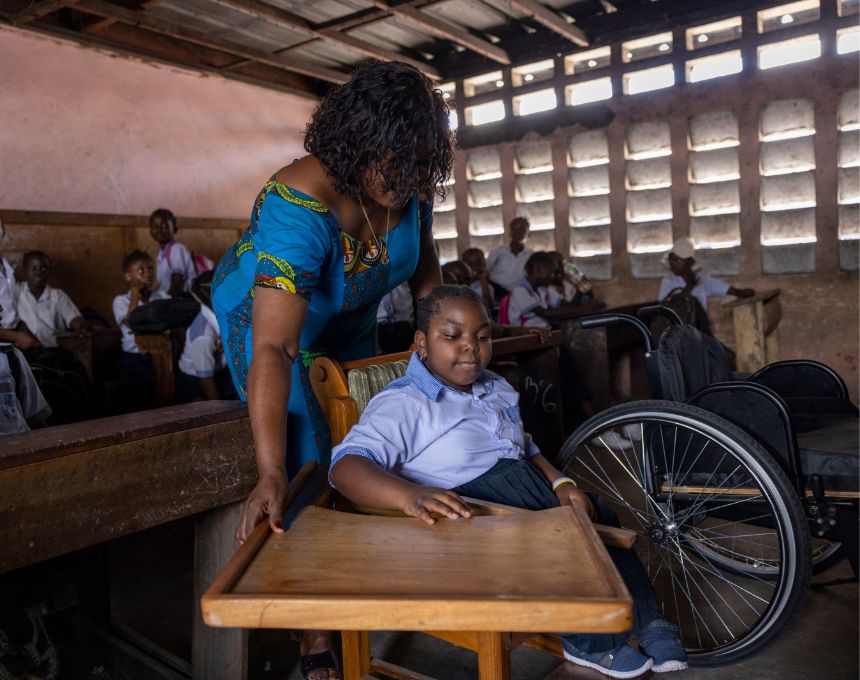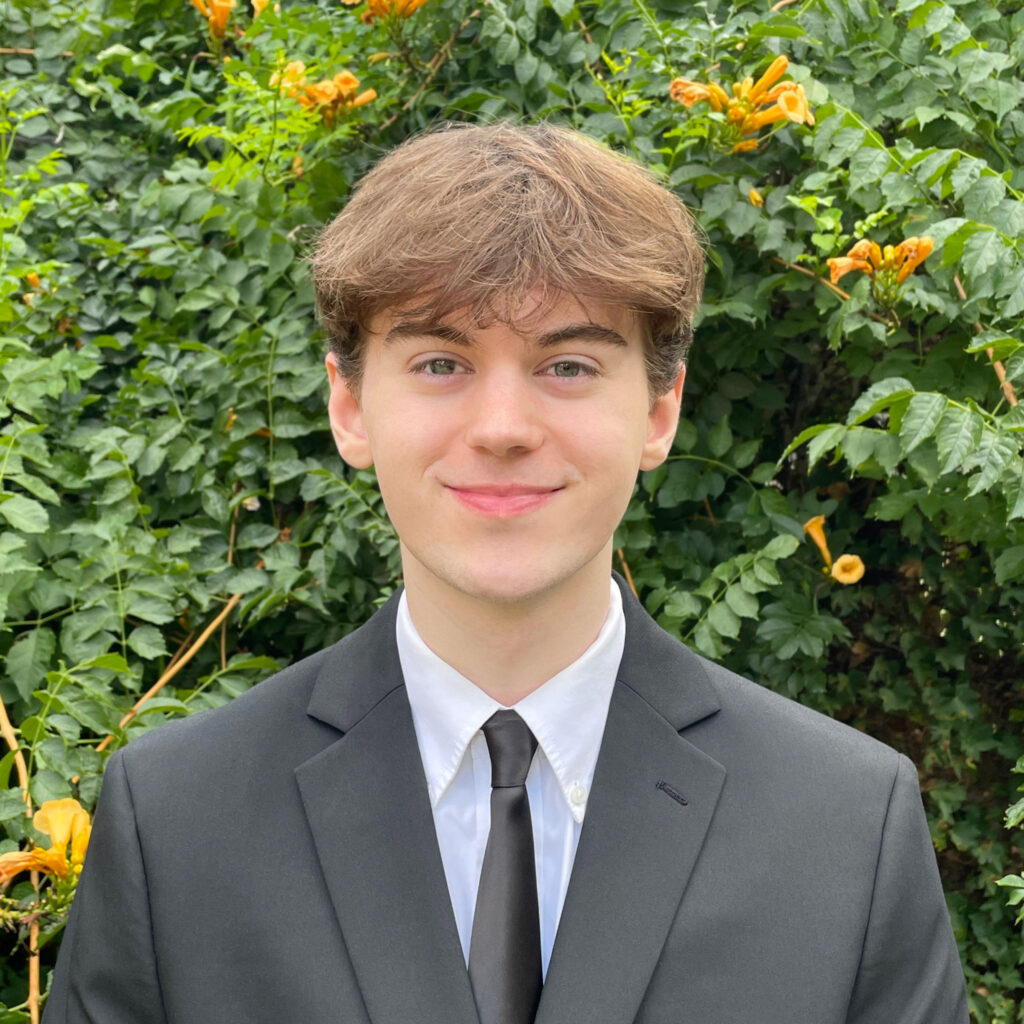Every child deserves the chance to learn, grow, and dream. Yet for too many, barriers like exhausting commutes to school, inaccessible classrooms, limited teacher support, and the struggle of feeling included make it difficult for young people to reach their potential.
But there’s hope. Around the world, nonprofits are creating brighter futures by making education more accessible, building inclusive spaces, and equipping young people with the tools and confidence they need to thrive.
This month, we’re shining a light on some of these incredible organizations and how you can join them in investing in the next generation.
Food For The Poor — World Teachers’ Day: FFTP and P4H Global bring award-winning quality education initiative to Haiti
A three-year pilot program funded by Food For The Poor (FFTP) is moving teachers in Haiti away from old-school teaching methods, such as rote memorization, to collaborative learning and student engagement with great success.
Now in its third year, the P4H Quality Education Initiative is underway in 38 schools, helping 343 teachers and 7,151 students throughout northern Haiti. The program has made such an impact that its creators are receiving the UNESCO-Hamdan Prize for Teacher Development in Paris.
The presentation coincides with World Teachers’ Day, introduced by UNESCO in 1994 and celebrated annually on Oct. 5. UNESCO’s international jury praised the P4H program, titled “Training Teachers to Transform Haiti,” for promoting creativity, curiosity, critical thinking, and collaboration among students, directors, and the community.
“We believe that in order to see a transformation in Haiti, quality education is at the heart of that transformation,” said Bertrhude Albert, Ph.D., CEO/Founder of P4H Global. “Every economic researcher will tell you a strong educational system is a prerequisite toward seeing a developed nation.”
The P4H Quality Education Initiative adds another layer to interventions in developing countries that focus on building schools, but not always on addressing the quality of education they provide. The program has been very well-received by participants.
“Professionally, the training has increased my knowledge and has given me strategies to make my work more effective,” said Augustin Juline from Vision de l’Aigle, Cap-Haïtien. “I have already seen the impact this training has had on my students.”
A quality educational program is needed more than ever in Haiti. The COVID-19 pandemic made a devastating impact on education around the world. By April 2020, 1.6 billion students were out of school and Haiti was among the countries that could not provide remote learning. Schools have reopened, but students still lag academically.
“Providing a quality education may not be top of mind during the unrest Haiti is experiencing, but it is a critical factor in helping people lift themselves out of poverty,” FFTP President/CEO Ed Raine said. “The P4H Quality Education Initiative brings hope in the ongoing struggle, and we’re grateful that we can continue this landmark program despite the turmoil in Haiti.”
In addition to teacher training, the P4H initiative provides training for school directors and encourages parental and community involvement in each school. The process began two years ago with a diagnostic review, followed by intensive teacher training.
“Eighty percent of teachers in Haiti have not gone through any kind of pre-service training,” said P4H COO and co-founder Priscilla Zelaya, Ph.D. “They’re going into the classroom without the background knowledge of how to impact their students.”
Training emphasizes foundational educational practices, such as developing effective lesson plans and moving away from rote learning – where children repeat lessons without fully grasping the context of the lesson – to a collaborative teaching style.
“Research shows that when students are engaged in the material, they are learning more,” Zelaya said. “So, we give teachers the tools to help them engage with students.”
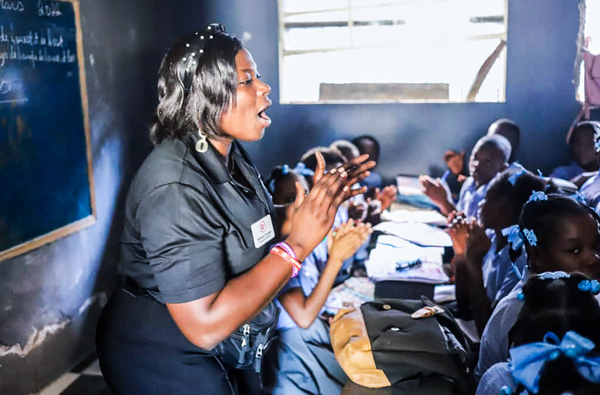
Ashoka — Fostering supportive environments that enable changemaking
Ashoka Fellows foster environments conducive to changemaking on all levels. Data from Ashoka’s most recent study shows that fellows invest their energy in the creation of communities where individuals feel psychologically and physically safe, cared for, and supported. They make certain that people are treated with dignity and feel accepted, establishing a strong foundation of trust needed to generate and sustain collective action. Often, fellows foster these environments within the walls of the organizations they run, creating an organizational culture of safety. Likewise, they foster these changemaker-friendly conditions wherever they convene the broader community in public spaces from classrooms to community squares. In doing so, individuals feel comfortable to share their ideas, work with others, and build something new, as is illustrated by Vishal.
The organization of Indian Ashoka Fellow Vishal Talreja, Dream A Dream, strives to create supportive environments for children and young people from vulnerable backgrounds to overcome adversity and learn to thrive. Starting from the deep understanding of their various adverse childhood experiences and their long-term effects on the life opportunities of youth, Vishal and his team develop a range of comprehensive programs.
At the core of their work with youth is the creation of learning environments which are trustworthy, non-judgmental, creative, and safe. With the help of partnerships with schools, companies, volunteers, and many other organizations, Vishal has been successful in creating supportive environments for the children and youth not only to learn valuable life skills, but also to develop healthy relationships and to offer them exposure to new and varied experiences thus helping them thrive for life.
The work of Vishal and his team has also evolved from directly developing life skills of youth and scaling those programs to working with facilitators such as teachers and governments to build and strengthen the frameworks for transformative education. The team has become increasingly more aware of the systemic barriers and inequities youth face despite the life skills acquired through the programs, so now their focus is on changing the societal intersectional biases and stereotypes that come in the way of young people. Using Dream a Dream as a lab, they are addressing issues of agency, power, privilege, and internalized biases within the organization, where many of staff are alumni of the programs, before attempting them in complex systems such as public education. Pedagogical approaches grounded in safe and supportive environments are then taken into departments of education across India to transform behaviors of second line actors deciding for young people and ensuring they are designing curriculums, training, pedagogy, and assessments on principles of care, safety, equity, and thriving.
One and a half million children have been impacted through Dream a Dream’s state partnerships in Delhi, Jharkhand, Uttarakhand, Telangana, and Karnataka, and 35,000 teachers have undergone training programs.
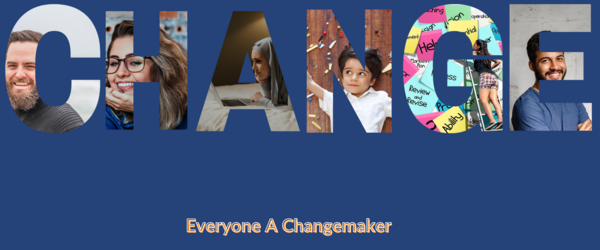
World Bicycle Relief — Students like Aleni go safer to school
Going to school used to be a difficult task for Aleni. The walk, which is 6 to 7 kilometers, took at least three hours each way. The river on her route in Ntchisi, Malawi, sometimes became uncrossable. “Some days, I wouldn’t go to school because I was very scared of meeting certain boys on the path. They may shout, throw stones, or stop me and make propositions,” said 16-year-old Aleni. “I could not avoid these boys.” Aleni could only embark on her trek to school if she wasn’t too tired from the previous day’s journey. “My friends used to discourage me about school. Some even mocked me – told me to drop out of school so that l should be like them. They would say, ‘Why are you bothering yourself like that, walking long distances to school? Why can’t you just leave and be like us?’” But Aleni didn’t let that discourage her.
“After receiving the Buffalo Bicycle, my school life has changed so much. My performance has greatly improved. Now my journey to school is easier and faster,” says Aleni. “The same friends are admiring me now. Most of them have gone back to school, hoping to get a bicycle one day, just like me.”
Through World Bicycle Relief’s education programming, students like Aleni receive bicycles to help improve attendance, performance, and retention in school. With a bicycle, students’ academic performance increases up to 59%.
“Education is good because once l complete my studies l will get a better job and support myself and my parents,” Aleni says. If Aleni completes standard 8, she will be the first in her family – and the first from her community – to go to secondary school. Aleni’s trip to school remains difficult, taking almost 2 hours each way. But she no longer fears the boys along the road. And the saved time and effort leave her less exhausted in the mornings.
Now, she can focus on dreams for the future: becoming a nurse. “As a girl l feel it is very important for women to be self-reliant and independent. I use my bicycle to go to church, to go to market, to go visit the hospital, to go to school, and to go play with my friends.”
“I am proud of myself.”
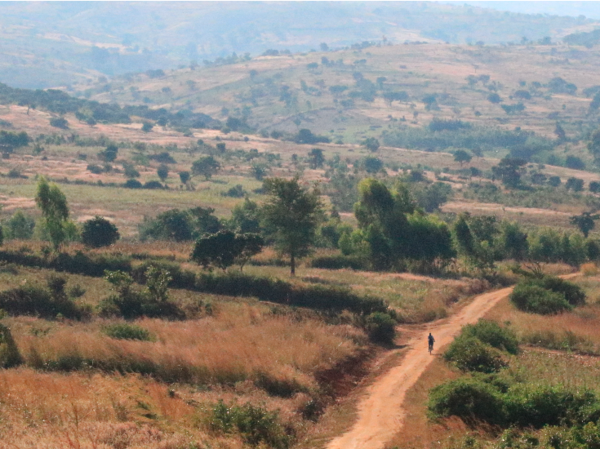
Humanity & Inclusion — Daïsane’s wheelchair opens new doors
Equipped with a specially adapted wheelchair by Humanity & Inclusion (HI), Daïsane is more independent and can play with her classmates at recess.
Daïsane, 10, lives in Lemba, in the Democratic Republic of the Congo. Born with club feet, she underwent several unsuccessful surgeries and found it almost impossible to walk. After coming in contact with HI in 2021, Daïsane has been equipped with a number of assistive devices to help her thrive. At school, she was given a wheeled chair with a small desk and a footrest to support her ankles. She also has a new wheelchair to move around at home and make the trip to school.
Daïsane’s older sister, Vasli, 27, is a law student and an active member of her community. Vasli explains that before she received her wheelchair, Daïsane used to move around by using her hands to drag herself along the floor. “When she got her wheelchair a few weeks ago, she was grinning from ear to ear,” Vasli says. “Her face lit up.”
At last, Daïsane could finally move around by herself ─ in the courtyard in front of her home, on the road to school, and on the playground. “Before, we paid for a motorcycle taxi to take Daïsane to school,” Vasli explains. “It was quite expensive, but now she can go in her wheelchair. It takes us about an hour each way, but it saves money.”
Daïsane loves to play cards with her sister, but her real passion is drawing – especially different kinds of clothes. In fact, her mind’s already made up: she’s going to be a fashion designer one day!
Once she arrives at school, the concrete pavements laid by HI make it easier for Daïsane to get to class. As part of its support to her inclusive school, HI has also equipped the classrooms with wider and lower chalkboards so everyone can use them. The teachers have also been trained to tutor students with special needs.
In 2019, the Democratic Republic of the Congo made education free for all. Previously, parents had to pay to enroll their children in school, and schools used this money to pay their teachers. Now, teachers’ wages are funded by the government in most state schools and it is also directly responsible for their facilities.
The new system has made education more accessible to students, but it also comes with its challenges. For instance, two years ago, the school that Daïsane attends had 600 students. Now, enrollment has risen to 1,100 children. Some teachers have 60 children in their classes. The school receives just $35 a month for maintenance, supplies, and equipment. Despite the larger class sizes, Daïsane’s teacher, Mrs. Agnès, says she has made good progress. “The wheelchair means she can leave the classroom and play outside,” Mrs. Agnès says. “She doesn’t have to stay inside by herself like she did before.”
Mrs. Agnès enthusiastically describes how she makes sure Daïsane is fully included in lessons and puts her in the front row at the start of each class. She also helps her move from her wheelchair to a small, specially adapted table. This means Daïsane can write and follow the lesson without having to make an extra effort. Her favorite subject? Math!
Daïsane is now fully engaged in class and plays with her friends at recess. She feels part of the school and can move around on her own with dignity.
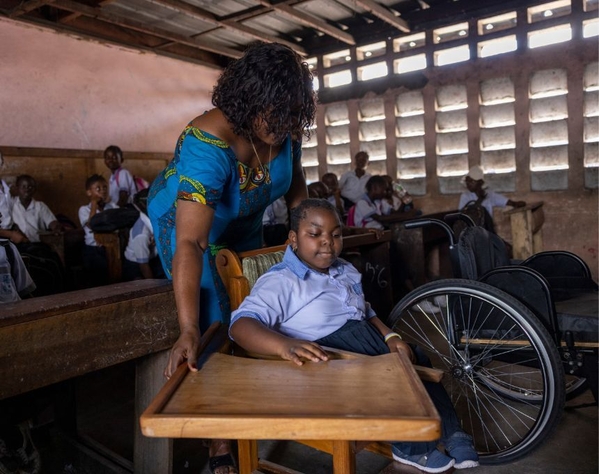
Save the Children — Eager to excel
9-year-old Jayceon’s new favorite thing is “learning,” he says. “Improving my reading is important,” he adds.
Before participating in Save the Children’s in-school literacy and afterschool programs, Jayceon’s “reading level was unusually low for third grade and he was struggling with basic sight words,” said Betty, the program coordinator. Today, with the one-on-one instruction, guided independent reading practice, and comprehension-building book talks, the third-grader has made great strides at his school in northeast South Carolina.
“He has shown so much improvement recently, not only in his academic skills, but in his confidence and eagerness to excel,” said Betty. “He has very good manners, is respectful, kind, and modest, and sets a good example for his peers.”
Jayceon’s teacher, Celeste, says he participates more in class because the Save the Children tutors have “celebrated his successes and let him know mistakes are learning opportunities.”
Jayceon’s newfound confidence is undeniable when you listen to him read, Betty said, and he has “a big smile on his face when he figures out unknown words on his own.” He even chooses to stay on longer in the afterschool program on the days when his sister has to leave early for an appointment, just so he won’t miss a second of the action.
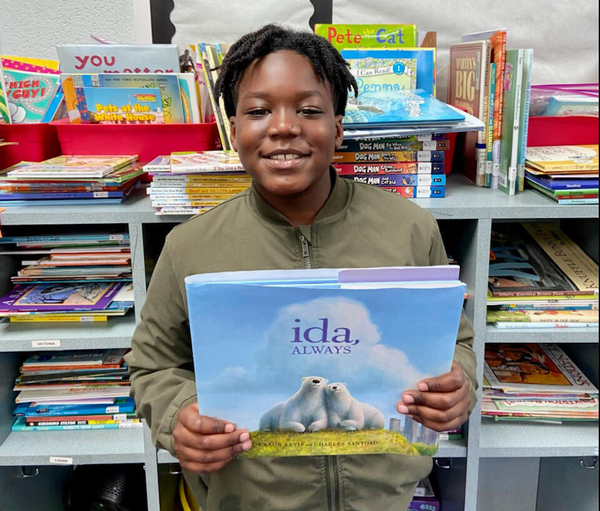
Sightsavers — “Her progress has brought a lot of happiness.”
The Support Mainstreaming Inclusion so all Learn Equally (SMILE) project in Kaduna, Nigeria is a community-driven inclusive education initiative to ensure all children can participate in their local school.
The project piloted the use of the Child Functioning Module: a set of questions created by the Washington Group/UNICEF to identify children who experience functional difficulties.
Hajara tries hard to stay polite and focused while her father meets the head teacher of her school, but gradually the boredom overtakes her and she puts her head down on the desk. Spotting this, the teacher smiles and pats her on the head. He asks about her interests outside school, and she’s suddenly more engaged; while her father talks about how she enjoys playing with dolls and pretending to cook, she makes the teacher laugh by interjecting: “I can also babysit!”
Hajara is one of the children who has benefited from the SMILE project through the Child Functioning Module, a questionnaire that helps schools to identify students who may have functional difficulties that could affect their learning. A parents’ guide also provides information on support networks and practical tips so they can support their child.
Hajara’s father shares how proud he is of his daughter. “She has so much sympathy and loves helping others. We don’t treat her any differently than her siblings. [At school] the interaction with other children was not smooth in the beginning because they were always making her cry, but it’s getting better. At home, the children are trying to help her instead of taunting her. It was a difficult road, but we got here.”
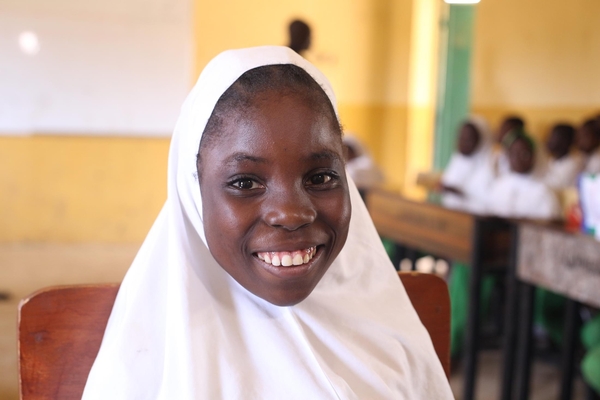
Feeling inspired? Consider donating to one or more of these charities in your workplace giving campaign.
Thank you Food for the Poor, Ashoka, World Bicycle Relief, Humanity & Inclusion, Save the Children, and Sightsavers for providing content for this blog.

